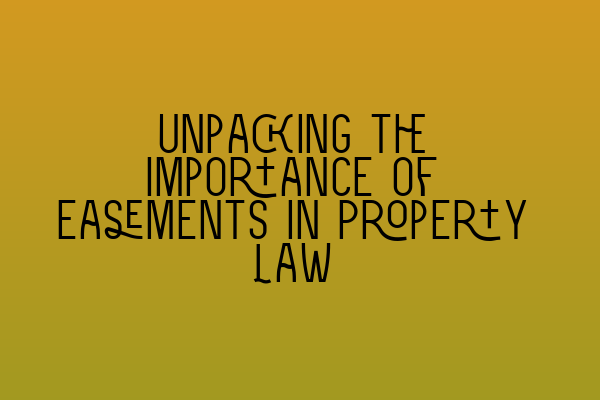Unpacking the Importance of Easements in Property Law
When it comes to property law, there are many legal concepts and terms that can be complex and confusing. One such concept is easements. Understanding easements is crucial in ensuring that property owners are aware of their rights and obligations.
So, what exactly is an easement? In simple terms, an easement is a right that allows someone else to use a portion of your property for a specific purpose. This could include rights of way, access to utilities, or even the right to install and maintain infrastructure.
Easements are important because they can have a significant impact on the value and utility of a property. Whether you are buying, selling, or developing land, it is crucial to have a thorough understanding of easements and their implications.
Types of Easements
There are several types of easements that can arise in property law:
- Right of Way: This is one of the most common types of easements. It allows for the transportation or crossing of one person’s land by another person or entity.
- Utility Easements: These easements allow utility companies to access a property to install, maintain, or repair utility lines such as water, electricity, or gas.
- Drainage Easements: These easements allow for the proper drainage of water across a property. They often exist to prevent flooding or water damage.
- Conservation Easements: These easements are designed to protect natural resources and preserve the natural features of a property. They often restrict certain activities or developments on the land.
- Aerial Easements: These easements grant an individual or entity the right to use the air space above a property. They are typically used in situations where buildings or structures extend beyond property boundaries.
These are just a few examples of the types of easements that can exist in property law. Each type of easement comes with its own set of rights and obligations, so it is important to thoroughly understand the terms and conditions of any easement affecting your property.
The Importance of Understanding Easements
Now that we have a basic understanding of what easements are, let’s explore why they are so important in property law.
Property Value: Easements can have a direct impact on the value of a property. For example, if your property has a right of way easement, it may be more attractive to potential buyers or developers. On the other hand, certain easements can restrict the use or development of land, which may decrease its value.
Property Use: Easements can also affect how you can use your property. For instance, if there is a utility easement on your land, you may not be able to build a structure or plant trees in the area covered by the easement. Understanding easements can help you plan and make informed decisions about property use.
Legal Obligations: Easements come with legal obligations for both the grantor and the grantee. As a property owner, you have the obligation to respect and maintain the terms of the easement. Failing to do so can lead to legal disputes and potential liability.
Given the potential impact of easements on property rights and obligations, it is crucial to seek legal advice when dealing with easements. A qualified property law solicitor can guide you through the process, review easement agreements, and ensure that your rights are protected.
Conclusion
Unpacking the importance of easements in property law reveals the significant role they play in property rights, values, and use. Whether you are a property owner, buyer, or developer, understanding easements is essential in making informed decisions and avoiding legal disputes.
If you have any further questions about easements or need legal assistance with property law matters, please contact SQE Property Law & Land Law. Our team of experienced solicitors is here to help.
Related Articles:
SQE 1 Practice Exam Questions
SQE 1 Practice Mocks FLK1 FLK2
SQE 2 Preparation Courses
SQE 1 Preparation Courses
SRA SQE Exam Dates
